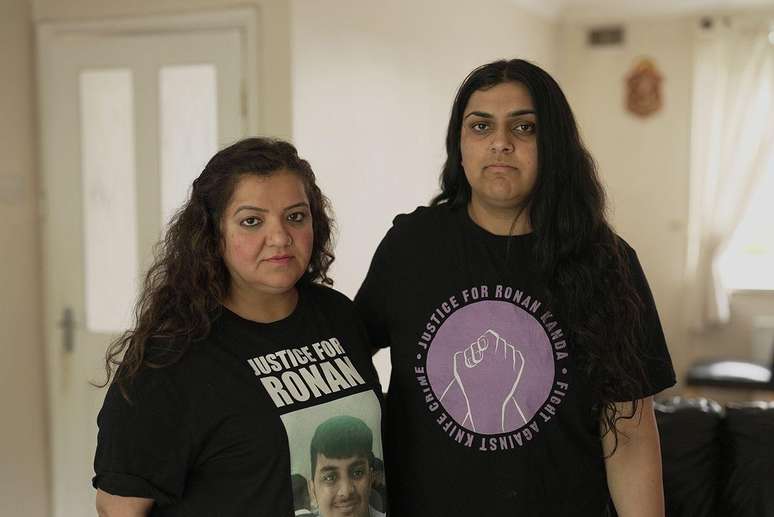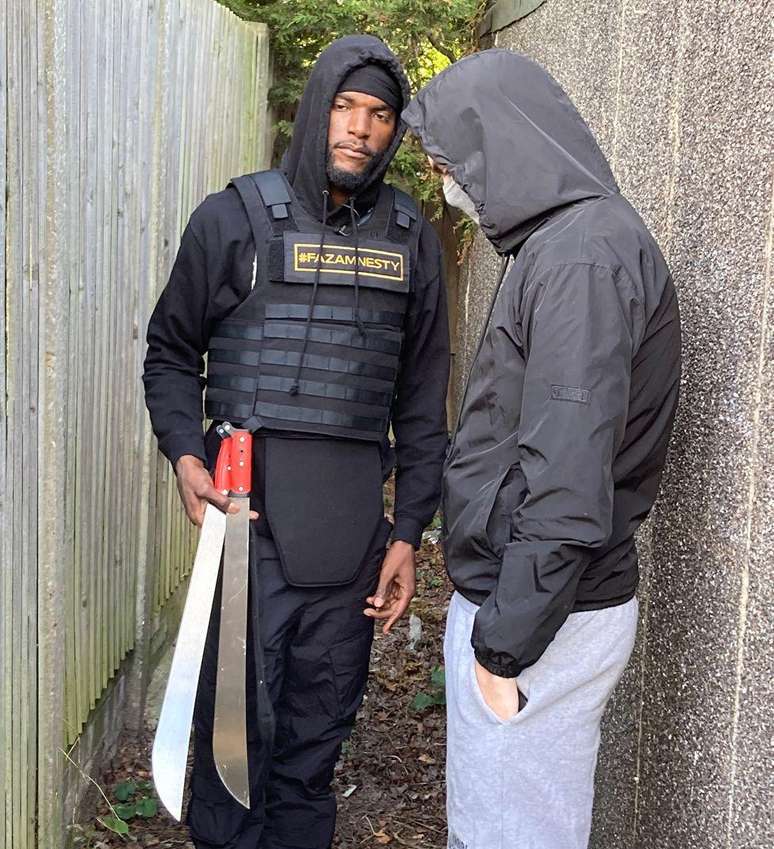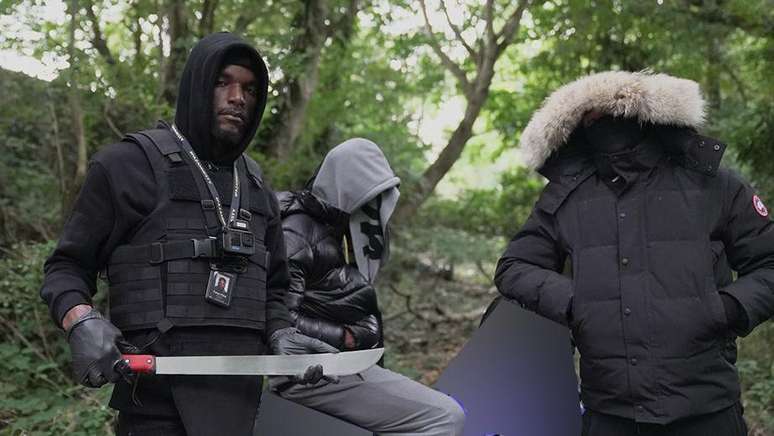Amid the ongoing ban on zombie knives, the BBC reveals the true extent of crimes involving these ‘impact’ blades.
Buying a “zombie knife” — a type of ornamental knife or melee weapon inspired by zombie movies and TV shows — is as easy as ordering food through an app, says 20-year-old Matthew, a Briton. He bought his first “Rambo”-style knife when he was 16.
On a quiet street south of Luton, north London, Matthew – not his real name – says “everyone” carries a knife.
“People think they need it,” he explains, wearing a balaclava. “If you have a pocket knife and someone shows up with a Rambo, you think, ‘Why don’t I get a bigger one?'”
“If you have the bigger gun, you have a better chance. If my knife is bigger than theirs, I’ll win.” However, Matthew says he’s ready to part with her.
“Mature. You realize it’s not worth it, I’ve already lost people.”
From this Tuesday (24/9), it will be illegal to own “zombie knives” and machetes in England and Wales.
The new legislation will close a loophole and make it a punishable offence to possess, manufacture, carry or sell a wide range of “display” knives favoured by criminal gangs.
Zombie-style knives and other machetes are classified as weapons with blades longer than 20 cm, often with serrated edges.
There is an amnesty and compensation program in place, encouraging people to hand over their guns before the ban goes into effect.
In the UK, the public’s access to firearms is highly regulated and subject to strict control measures.
“I see a lot of Rambo and zombie knives”
But Matthew won’t hand over his machete to the police. Instead, he’s decided to hand it over to Faron Paul, an activist who runs a knife collection initiative.
Faron, who nearly lost his life after being stabbed, knows the devastating effects of knife crime. He travels around the UK collecting hundreds of weapons from people who want to get rid of them, either by handing them over to the police or destroying them.
“I see a lot of Rambos and zombie knives,” Faron tells BBC News. “They’re the most common ones I see. I get so many messages from all over the UK it’s hard to keep up.”
Faron has been running this amnesty service since 2018 and says the knives are getting bigger and bigger.
Data obtained by the BBC indicates that crimes involving bladed weapons have increased in the UK.
The number of recorded crimes involving machetes, swords or “zombie knives” has nearly doubled in five years, according to information obtained through requests under the Access to Information Act.

In 2023, these weapons were mentioned in more than 14,000 criminal records, according to data from 32 police districts in England and Wales.
Machetes accounted for nearly 10,000 of these cases, double the number recorded five years earlier.
While the new legislation includes machetes and other large blades, it does not cover all swords.
Pooja Kanda, mother of 16-year-old Ronan Kanda, who was killed in a sword attack in Wolverhampton in June 2022, has led a campaign to ban the online sale of all large knives.
“A sword went through my son’s heart. I’m shocked that they were available when it happened, and even more shocked that they continue to be sold after what happened to Ronan,” she says.
The government began recording the type of blade involved in the killings in April 2022.
In the first year of available data, 244 murders in England and Wales involved sharp instruments, 14 involving machetes, seven involving zombie knives and three involving swords. The most common type of murder was kitchen knives, responsible for 101 murders.
Ronan’s sister Nikita says young people are increasingly attracted to larger knives.
“It’s about the culture of selling machetes, zombie knives, and swords,” he says. Nikita believes the teenager who killed Ronan was “attracted” to large knives.
She blames the ease of purchasing these weapons online.
“Easy to buy, hard to deliver”

In London, Faron is on his way to collect two machetes from a 21-year-old, “Jon” (not his real name), who bought them after he was kidnapped and stabbed 12 times in 2022 by former schoolmates who wanted money.
“I was walking home at night when they took me to a field,” Jon says.
“They wanted me to tell them where the money was. [da loja onde trabalhava]probably because of my Instagram.”
Jon reports that he was cut on the arm with a machete and stabbed in the thigh, almost hitting a major artery. After the attack he decided to buy “something the same size” for protection, but now he feels that is no longer necessary.
Faron notes that many of the knives he receives are so large that they don’t fit into the collection boxes distributed by London police stations.
Even with the new law and amnesty plan, Faron says many people are still afraid to hand over their weapons to the police. Many young people feel unsafe when they go to police stations.
Jon’s knives are just a few of dozens Faron has recently collected.
The Home Office said that, in addition to the new legislation, there are plans to ban ninja swords. The government is also reviewing the sale of knives online, with a report expected later this year.
This review will seek to identify flaws in the legislation that allow these weapons to be purchased illegally over the Internet.
Jon confirms that it was “easy” to purchase his knives online.
“They were the cheapest I could find and there was no ID check. I did what I thought was necessary.”
Source: Terra
Rose James is a Gossipify movie and series reviewer known for her in-depth analysis and unique perspective on the latest releases. With a background in film studies, she provides engaging and informative reviews, and keeps readers up to date with industry trends and emerging talents.






